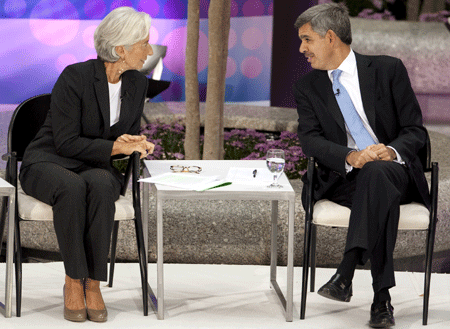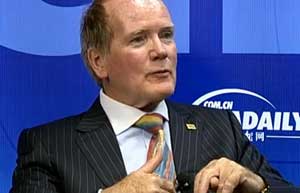Pimco: European recession in 2012
Updated: 2011-09-27 07:45
(China Daily)
|
|||||||||
|
Christine Lagarde (left), managing director of the International Monetary Fund, and Mohamed El-Erian, chief executive officer of Pacific Investment Management Co, before the start of a panel discussion on Thursday in Washington DC. [Joshua Roberts / Bloomberg] |
Investment firm predicts little to no growth amid concern over global outlook
WASHINGTON - Pacific Investment Management Co (Pimco), which runs the world's biggest bond fund, is predicting that advanced economies will stall over the next year as Europe slides into a recession, underscoring mounting investor concern about the global economic outlook.
There will be little to no economic growth in industrial nations in the coming 12 months as Europe's economy shrinks by 1 percentage point to 2 percent and the US stagnates, said Mohamed El-Erian, chief executive officer of California-based Pimco. That will leave worldwide expansion at about 2.5 percent, less than the 4 percent forecast by the International Monetary Fund (IMF) for this year and next.
Such gloomy sentiment dominated weekend talks of policymakers, investors and bankers in Washington, where the IMF and the World Bank held their annual meetings. "For the next 12 months, the global economy will slow materially with advanced economies struggling to grow much above zero," El-Erian said in a Saturday interview in Washington. "Emerging economies will maintain faster growth, albeit not as high as the last 12 months."
Finance ministers and central bankers urged European officials to intensify efforts to contain their 18-month debt crisis as Greece teetered on the edge of default. US Treasury Secretary Timothy F. Geithner called on governments to unite with the European Central Bank (ECB) to beef up the capacity of their 440-billion-euro ($594 billion) bailout fund, warning that failure to act threatened "cascading default, bank runs and catastrophic risk".
Trillion euros
Bank of Canada Governor Mark Carney estimated that 1 trillion euros may have to be deployed. UK Chancellor of the Exchequer George Osborne said a solution is needed by the time that G20 leaders meet in Cannes, France, on Nov 3 and 4.
"Patience is running out in the international community," Osborne said. "The eurozone has six weeks to resolve this political crisis."
Whether "the markets will accept the luxury of six weeks grace remains to be seen", said Jim O'Neill, chairman of Goldman Sachs Asset Management in London. "In the interim, policymakers will have to feed markets with hope as to what might arrive in November and then not disappoint."
Reports this week may reinforce the sense of weakness, with economists predicting that US consumer spending slowed in August and business confidence in Germany, Europe's largest economy, fell to a 15-month low this month.
The IMF said last week that the turmoil has generated as much as 300 billion euros in credit risk for the region's banks and advocated capital injections.
German Chancellor Angela Merkel said eurozone leaders must erect a firewall around Greece to avert a cascade of market attacks on other euro states that will risk breaking up the currency area. "We have to be in a position to react," Merkel said on Sunday. "We have to be able to put up a barrier."
European policymakers hinted they may soon heed Geithner's advice and use leverage to increase the firepower of their rescue fund. German Finance Minister Wolfgang Schaeuble and European Financial Stability Fund CEO Klaus Regling played down speculation the ECB would be needed to increase the fund's heft.
World waits
"Wait a few more days," said Regling, when asked for details.
Finance officials will also discuss this week speeding implementation of a permanent rescue plan by a year to next July, according to a working paper. ECB Governing Council members Ewald Nowotny and Luc Coene signaled in interviews in Washington that the central bank next week may say it will begin offering banks unlimited liquidity for as long as a year.
Greek Finance Minister Evangelos Venizelos said his country "wants to make it and will make it" and that it will always be a member of the eurozone. Prime Minister George Papandreou said on Sunday that the European Union must take "strategic decisions" and that the end of the global economic crisis "appears even more distant".
IMF insufficient
While the IMF vowed to "strongly support" Europe, Managing Director Christine Lagarde warned its $384 billion war chest may not be enough to meet all aid requests if the world economy worsens. The current lending capacity "looks comfortable today but pales in comparison with the potential financing needs of vulnerable countries and crisis bystanders", she said.
The world economy will find some support from emerging markets, which will grow 4.5 percent to 5 percent over the next 12 months, and Japan's 1.5 percent expansion, El-Erian said.
JPMorgan Chase & Co Chief Economist Bruce Kasman said in Washington that Greece is already insolvent and headed toward a depression that will roil the eurozone. His team revised their forecast last week to reflect the region entering a recession in the next quarter and the ECB cutting its key interest rate on Oct 6 to 1 percent from 1.5 percent.
"I fear very much that the situation will deteriorate further before it improves," said Axel Weber, the former president of the Bundesbank, in Washington on Sunday. "We will see much more drastic action" by policymakers if the situation in financial markets gets worse.
Bloomberg News
(China Daily 09/27/2011 page17)











